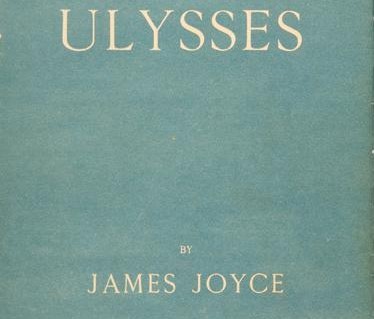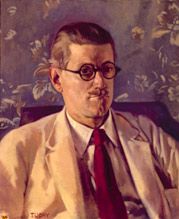Bloomsday

June 16 (1904)
June 16 is the day we commemorate Ulysses, the massive (“unreadable modernist”)* novel by James Joyce (2/2/1882 to 13/1/1941) which turns on events on that day in Dublin. It is structurally based on The Odyssey, a work written a few thousand years ago (Leopold ‘Poldy’ Bloom is Odysseus, or Ulysses in Roman parlance; Marion Bloom is Penelope, and Stephen Dedalus is Telemachus), so that episodes, action (if you can call it action – not a whole lot happens) and characters follow, roughly, Homer’s book. Psychologically, Joyce adds the modernising shade of Hamlet.
For The Varnished Culture, the novel is too big and ragged, too show-off and self-indulgent, too frozen in June 16, 1904, to be called a complete masterpiece, but as a comic accretion of brilliantly chosen words and stylistic parodies it can still dazzle – on that level, there is no doubt it is a work of art, a rich, ribald, Rabelaisian riff, and one that resonates still (unlike the turgid gush that is Finnegans Wake). We recommend starting by dipping into the book at random, immersing oneself in Joyce’s rhythms and argot – getting to know Bloom and Stephen and befriending them, and once there, start at the beginning. His disporting of words requires close attention. Here’s some random brilliance from Jimmy:
A bloated carcass of a dog lay lolled on bladderwrack…A point, live dog, grew into sight running across the sweep of sand.
Mr Leopold Bloom ate with relish the inner organs of beasts and fowls. He liked thick giblet soup, nutty gizzards, a stuffed roast heart, liver slices fried with crustcrumbs, fried hencod’s roes. Most of all he liked grilled mutton kidneys which gave to his palate a fine tang of faintly scented urine.
Makes them feel important to be prayed over in Latin. Requiem mass. Crape weepers. Blackedged notepaper. Your name on the altarlist. Chilly place this. Want to feed well, sitting in there all the morning in the gloom kicking his heels waiting for the next please.
He is prematurely bald from selfabuse, perversely idealistic in consequence, a reformed rake, and has metal teeth. In consequence of a family complex he has temporarily lost his memory and I believe him to be more sinned against than sinning.
…his heart was going like mad and yes I said yes I will Yes.
Ulysses dazzled the world from the time of its troubled conception, and birth in 1922, and has since passed into literary legend. Here are some random comments, showing both high praise, haute disappointment and at times, marvellous levels of misunderstanding:
“What Joyce is out to show is nothing less than all life, all history, contained in a single day in Dublin in 1904…It attempts to encompass the whole of life; it takes in birth and death; and whatever it deals with is done in terms of astonishing virtuosity.” [1]
“Ulysses has enough verbal splendor to furnish a legion of novels, yet we sense that the book’s central position in the Canon transcends Joyce’s styles, masterful as all of them are.” [2]
“…it was like, and always will be, nothing one has read before…I am now less tolerant of his faults. I feel that so much of…Ulysses, even when the obscurity has been penetrated, is fundamentally uninteresting that there must be some failure of conception or execution or both…” [3]
“…my brother, I am afraid, never quite rid himself of that Iago-complex towards women…” [4]
“[the writer must have] severe restriction of cerebral activity…the character of a worm cut in half that can grow a new head or a new tail as required.” [5]
“…brilliantly executed, and packed with first-rate observation of manners, of the most delightful humour and even passages of original beauty. But it had no firm and logical linear structure. Rather it was a chaotic mosaic.” [6]
“…is [Joyce], novel or no novel, letting himself rip?” [7]
“Because the style is so extreme, though, the novel can seem abstract and arid, or uniquely rich…Ulysses…cannot be judged at all except by the individual reader. It is either to one’s taste or not, and no amount of lobbying by readers with other tastes can change one’s mind.” [8]
* Tucker Carlson, Ship of Fools (2018) p. 123.
[1] Walter Allen, The English Novel (1954) pp. 353. [2] Harold Bloom, The Western Canon (1994) p. 417. [3] Cyril Connolly, Previous Convictions (1963) pp. 271, 278. [4] Stanislaus Joyce, My Brother’s Keeper (1958) p.248. [5] Carl Jung, quoted in Carol Loeb Shloss, Lucia Joyce (2003) p. 277. [6] Wyndham Lewis, Rude Assignment (1950) p. 60. [7] J. B. Priestley, Literature and Western Man (1960) p.417. [8] Jane Smiley, 13 Ways of Looking at the Novel (2005) pp. 438, 440.
Leave a comment...
While your email address is required to post a comment, it will NOT be published.



0 Comments